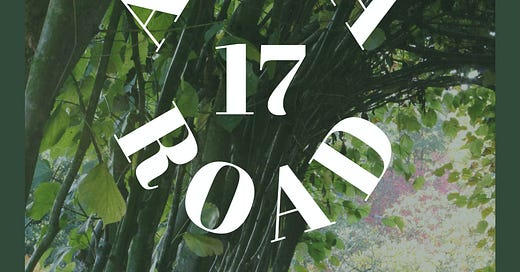II
And, his foot against the bottom rail, move it does, though stiffly of course. He knows its resistance is due to rust on the hinges and the tufts of weed against which he has to push in order to get the gate open far enough for him to step through. Once across the boundary he can see that the path is reasonably intact, and so — brushing his way past an ancient hebe and a briar rose of some persuasion — he walks the few yards necessary to find himself standing once again before the front door. Though badly tarnished, the old chrome digits ‘1’ and ‘7’ are still there. He resists the urge to try and wipe them clean with his coat sleeve. Instead, he turns ninety degrees and walks along the left half of the front of the house and onto the lawn where, after another pace or two, he turns again this time to examine the easterly aspect. The side of the building is much like the front, the garden here similarly unruly; ahead of him the old hedge George used to tend so lovingly has lost all sharp definition. Perhaps it is this neglect which strikes Owen as the saddest of all. Part-way along the hedge, he can still make out the arch which leads through to the back garden, and, without any premeditation or conscious decision-making, he walks through the space, almost apologetically brushing the encroaching branches aside.
Akin to the front, the framework of the back garden remains intact, pretty much as he had always known it: the long herbaceous borders running down each side, the three apple trees two-thirds of the way back (and to which George used to refer as his ‘orchard’) and beyond that the small vegetable patch with the raised beds where Florence would try — and fail — to grow carrots and onions each year. All have surrendered to time: the borders are weed-filled; the apple trees vast and unruly; the vegetable patch virtually indistinguishable in a tangle of weed and long grass. Owen wonders when the lawn last saw a mower, and who had wielded it. As he scans, he sees the old uneven patio George had laid one summer to accompany a grand idea about ‘al fresco eating’, and there, at a jaunty angle between house and garden — as it always had been — the ornate iron bench Florence had bought on a whim that same year. It had been, she said “George’s patio’s christening present”. They had all laughed.
It is a recollection which makes him smile; a smile which can only be enhanced by the sight of Maddie sitting there, looking his way. He lifts a hand in a shy half-wave, and finds himself walking towards her.
“I thought I might find you here,” Owen says as he comes to a halt in front of her, turning again to take in the entirety of the garden before sitting down in the space she has left for him.
“Where else?”
“Indeed.”
“It’s a shame,” she says.
“What is?”
“Uncle George’s trees. How they’ve been neglected. I’ve never seen them in such a state.”




